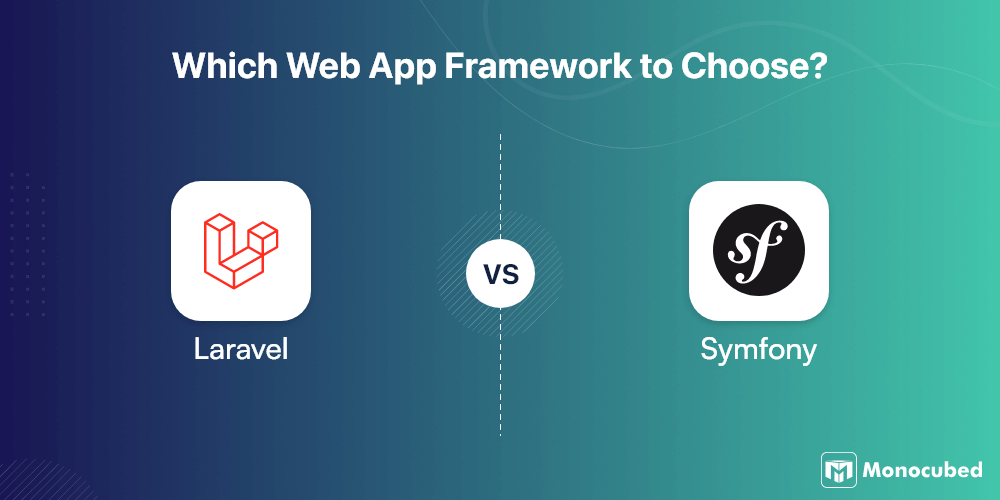More than 14,00,000 websites are powered by PHP in the USA.
The adoption of the PHP framework is increasing among small to enterprise businesses.
Before developing a new PHP web application, one question that strikes the mind: Which framework to use for your web application development project?
But the good news is you have the support of the best laravel development company. Our team will guide and help you to select the best framework.
Let’s help you to narrow your search for a high-performance PHP framework by comparing Laravel vs Symfony.
Both of these frameworks stand out from all other frameworks. Check the in-depth comparison between these frameworks.
Table of Content
Framework Comparison: Laravel vs Symfony
In the following section, you’ll see the comparison between both these frameworks. Check out all the comparison factors to know how Laravel differs from Symfony.
| Comparison Factors | PHP Laravel | PHP Symfony |
|---|---|---|
| Basic Performance | Laravel framework uses Symfony components. Its average loading time is 60 milliseconds. This framework is ideal for projects with a shorter timeline. | Symfony website takes more time to load and its loading time is 250 milliseconds. Symfony PHP framework requires more time and development effort as compared to Laravel. |
| Scaling and Modularity | Laravel’s architecture is different from other PHP frameworks. This framework works on an MVC-based design. | Symfony works on a packaged modular architecture that consists of many reusable components. |
| Default Templating Engine | Laravel uses one of the powerful default template engines i.e. Blade template engine. It allows Laravel developers to use plain PHP code. Using this template engine, create an app without additional costs. | Symfony uses a template engine named Twig allowing PHP developers to develop more web designer-friendly templates as they are concise. The twig template engine is a widely known solution that companies used to offer high-end PHP development services. |
| Database Support System | Both Laravel and Symfony use ORM (Object Relational Mapping) for data access and database support. Laravel uses Eloquent and database migrations manually. With object-related mapping, data manipulation becomes easy. Laravel supports only these database languages
|
Symfony uses doctrine to create repository functions for data access and database support. Database migrations and manipulation becomes automated and simple. Symfony provides more options such as
|
| Learning Curve | Laravel has a simple learning curve. Developers can learn this PHP framework in numerous methods including better documentation, video support, and tutorials. | Symfony has a complex learning curve as compared to Laravel. This framework doesn’t offer much community support or tutorials as compared to Symfony. |
| Security | The security system in this PHP framework is powerful but it is also hard to set up. Laravel supports numerous authentication methods. | The security system in Laravel is simple as basic features are enough in the majority of circumstances. |
| Speed | The performance of Laravel is easily expandable. This PHP framework allows rapid development with minimal coding effort. | As compared to Laravel, Symfony is slower while creating complex web projects. This framework promotes adaptability and peak performance. |
| Scaffolding | No scaffolding tool is integrated into the Laravel framework. Several tools can be combined with this framework. | Symfony comes with a scaffolding tool i.e. SensioGeneratorBundle that provides instructions for scaffolding bundles and CRUD-based backends. |
| Dependency Injection | You don’t need to create a dependency configuration with this PHP framework. Laravel comes with fantastic auto-detection. | Symfony comes with a feature named ‘autowire’ that offers comparable functionality. This framework is much more complex as compared to Laravel. |
Want to Build a Secured Web Solution for Your Business?
Talk to us. Our experienced web developers are well versed in building scalable web solutions using innovative tools and technologies.
Now let’s talk about the meaning of Laravel.
What is Laravel?
Based on an MVC architecture, Laravel is an open-source and the most popular PHP framework that allows to development of scalable web apps.
This framework is faster at fixing errors in web applications. Also, to perform faster development, many developers rely on Laravel development tools.
Understood the meaning of Laravel? Now, look at the following features of Laravel.
What are the Key Features of Laravel?
Here are the 8 core features of Laravel you should know.
-
Authentication
-
Effective ORM (Object Relational Mapping)
-
MVC Architecture Support
-
Command-Line Interface For Artisan
-
Strong Application Security
-
Innovative Templating Engine
-
Unit Testing
-
Automatic Pagination
Authentication is one of the most important factors in a web app. Laravel offers easy and quick authentication as this PHP framework includes an inbuilt authentication system. As a developer, you just need to configure models and controllers to run your web app smoothly.
Laravel framework includes an inbuilt ORM allowing developers to query the database table using an easy PHP syntax. There is no need to write any SQL code. The best thing about this framework is that it offers simple integration between the Laravel developers and database tables.
Laravel works on MVC architecture to create MVC-based apps. This PHP framework offers faster development and also provides multiple views for a model. As Laravel separates the business logic code from the presentation logic code, there is no code duplication involved.
This is one of the amazing features of Laravel. Laravel provides an in-built tool for command-line called Artisan that handles the repetitive programming tasks. These command lines can also be used to develop the skeleton code, data structure, and data migration. So, this framework makes database management easy. Artisan also enables web developers to create their own commands.
It’s no secret that application security is an important factor in web development. A developer needs to follow numerous ways to secure the application while creating it. This framework uses the “Bcrypt Hashing Algorithm” to provide intact security.
Laravel is highly popular for its in-built lightweight templates. It also provides several widgets that integrate CSS and JS code using robust structures. Laravel templates are specially designed to create straightforward as well as composite layouts that make the development easier for web developers.
Laravel is the winner when it comes to unit testing. This framework is developer-friendly and helps web developers in doing numerous tests to identify flaws quickly. It also helps you save money and time and contributes to the evaluation of website performance.
Automatic Pagination is a highly popular Laravel feature. This feature reduces the time needed to write the code as Laravel contains in-built pagination.
Still confused about choosing Laravel, know the top reasons why Laravel PHP framework is better than other PHP frameworks.
When to Choose Laravel for Your Web Project?
PHP Laravel framework is the right framework to choose if you are new to the web development world. This framework is easy to learn and offers better tutorials. Laravel offers multiple advantages over other frameworks by facilitating rapid web development. It is advisable to choose Laravel if you are planning to develop a smaller web project.
When NOT to Choose Laravel for Your Project?
Laravel seems to be a better framework for development projects when you need to create web apps faster and don’t want to spend much money on them.
Learned everything about Laravel? Now, we are going to discuss Symfony in detail.
What is Symfony?
Works on MVC structure, Symfony is an open-source and another most popular framework that helps in creating scalable web applications. This open-source framework was earlier named a conventional PHP language. Symfony contains reusable components and decoupled PHP libraries allowing you to implement typical tasks without writing a long PHP code. This framework is suitable for complex projects as Symfony supports code reusability.
Hope you got to know the meaning of Symfony. Next move to the next section- key features of Symfony.
What are the Key Features of Symfony?
The following list highlights the 10 key features of this framework.
-
Structured MVC
-
Symfony Profiler
-
Reliability
-
Better Documentation
-
Robust Dependency Manager
-
Extensibility
-
Ease of Development
-
Powerful Debugging
-
Optimum Scope of Customisation
-
Large community & Long-term support
As the most popular framework, Symfony works on MVC which is ideal for scalable and systematic web development applications. This architecture speeds up the development process by separating the business and presentation layers from each other. It enables users to add new features without putting up extra time and effort.
Maintaining an application is one of the most daunting tasks for web developers. Symfony framework comes up with a profiler that monitors the behavior of your application. This profiler shows an informative panel at the bottom of the application. You can expand it to see the full-fledge details of several activities i.e. user authentication, routing, and logging.
As compared to other frameworks, Symfony has had the best of successes in terms of reliability. That’s why the majority of web developers choose Symfony for creating high-performance web applications.
The main issue that most PHP frameworks face is that documentation is incomplete. Symfony framework offers better documentation when compared with other frameworks. The documentation is well-structured and clearly written for developers.
Symfony framework uses the tool i.e. Composer to manage its reusable PHP components. As an efficient dependency management tool, the composer can be used to download and install various Symfony components and external packages in this framework. Developers can declare the libraries with ease in Symfony.
As everything is a bundle and adds functionality, Symfony developers can reuse bundles. No need to modify the Symfony framework as only the bundle can be configured to meet your unique project requirements.
Symfony developers doesn’t need to worry about minor functionalities. This framework works for small to large-scale projects because of its bundle-based architecture.
Symfony comes with a powerful and extensible debugging toolbar that makes debugging easy. This toolbar ensures that every new line of code must be tested to assure the stable working of an application.
Symfony comes with numerous customizable features that developers can choose for their development projects. This framework works on advanced OOPS service architecture and is highly scalable.
This open-source framework is well-tested and stable that gets updated on a regular basis. The Symfony website community has over 2,000 official contributors who not only create new components but also offer long-term support and advice.
Do You Want to Build a Scalable Web App?
Let’s help you build a scalable and high-performing web app for your business, contact us.
When to Choose Symfony for Your Project?
Symfony is a better choice when you want to work efficiently. As this PHP framework is well-structured and scalable, Symfony development services are highly used to develop large-scale and complex projects. The major reason to choose Symfony over other PHP frameworks is that this framework offers huge community support.
When NOT to Choose Symfony for Your Project?
As we have already told you that Symfony is the right PHP framework for a long-term, complex enterprise-grade web application, avoid using it for small-scale projects. Don’t use Symfony if your budget is limited as this framework needs higher financial outlays to deliver high-performance business websites.
So, finally, you go to know everything about Laravel and Symfony. Now check the in-depth comparison of Laravel vs Symfony.
In-depth Breakdown of Symfony vs Laravel
-
Performance
- Laravel – As the Laravel website takes 60 milliseconds to load, this framework works faster compared to Symfony.
- Symfony – A Symfony website takes 250 milliseconds to load thus affecting the page loading speed and overall performance of your website.
-
Development Time
- Laravel – The minimal code and better performance of Laravel allow developers to create web applications faster.
- Symfony – Symfony PHP framework requires numerous resources and more code efforts to develop high-end web apps.
-
Maintenance
- Laravel – Laravel’s development framework is not easier to maintain as compared to Symfony. So, this framework doesn’t aid developers to improve their efficiency.
- Symfony – With Symfony PHP framework, developers can enhance the functionality of web applications as this framework is easier to maintain.
-
Modularity and Scaling
- Laravel – Laravel’s strength circles around MVC architecture. This framework can’t help if you want to work outside the MVC paradigm.
- Symfony – Symfony PHP framework manages the code in a cleaner way, making it a better choice for complex and large-scale projects.
-
Functionality
- Laravel – PHP Laravel framework is less flexible as compared to Symfony so its functionality features are a bit complex.
- Symfony – Symfony framework offers convenience and encourages developers to manage core functional features instead of minor ones. This framework delivers error-free Symfony projects.
In comparison to Symfony, Laravel is a better choice in terms of primary performance.
Winner – Laravel
When it comes to considering development time, Laravel is a better alternative comparing Symfony. So, Laravel wins over Symfony in terms of development time and cost.
Winner – Laravel
In terms of website maintenance, Symfony outperforms Laravel.
Winner – Symfony
Symfony wins over Laravel when it comes to considering modularity and scaling.
Winner – Symfony
Symfony works better than Laravel when choosing a particular PHP framework based on functionality.
Winner – Symfony
As you have learned about the in-depth comparison between Symfony and Laravel, let us give you the answers to the most frequently asked questions about both these frameworks.
FAQs About Laravel vs Symfony
-
Which PHP Framework is suitable for your web development project?
The best PHP framework is Laravel as it has the best object-relational mapper compared to other frameworks. However, there are other PHP frameworks to consider such as Rails, Angular JS, Zend framework, and Symfony.
-
Which framework is more popular: Laravel or Symfony?
According to Google Trends, Laravel is famous compared to Symfony. as this PHP framework enables you to program with minimum coding and better performance.
And in some cases, the Symfony framework has the edge over Laravel as it becomes the right fit for complex app development projects. The popularity of both these frameworks depends on your project requirements.
-
What is Symfony suitable for?
Symfony is suitable for long-term complex website development projects as its custom functionality works well with your web application requirements. Its well-organized structure, clean coding, and good web development process make things easier for Symfony developers.
Which PHP Framework to Choose: Symfony or Laravel?
Both Laravel and Symfony are robust and reliable. There is no obvious answer to which PHP framework should be chosen. Let’s talk about these two PHP frameworks- Laravel vs Symfony. Laravel PHP framework is right if you are working on smaller web development projects. And if you have a long-term complex web application project, Symfony may be the better option as it is fast, stable, and long-lasting.
Want to know more about Laravel or Symfony? Schedule a free consultation with one of our dedicated and professional developers. We will be happy to assist you with our top-notch development services.
 By Jeel Patel
By Jeel Patel



